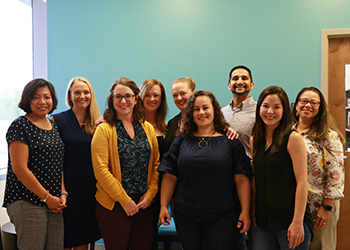About the Population Health Center and the Kaiser Permanente Community Wellness Hub
The Population Health Center represents the intersection of academics and practice with the goal to improve the public’s health and ensure practitioners are career-ready and lifelong learners. Community engagement and participation are vital to Center’s tri-part mission to deliver professional and workforce development, interprofessional clinical care, and population health research.
The Center will house the Kaiser Permanente Community Wellness Hub, where partners will coordinate delivery of resources to address social determinants of health such as access to housing, food, and medication for clinical patients.
Community partners co-located in the Hub will include: NOVA ScripsCentral, Northern Virginia Family Service, and Partnership for Healthier Kids.
The Kaiser Permanente Community Wellness Hub is made possible, in part, by a grant from Kaiser Permanente.
“As a part of our approach to care and our deep belief that good health requires more than clinical care, we are committed to creating opportunities and connections to health where the community needs it—in traditional, as well as unexpected settings,” says Celeste James, executive director, Community Health for Kaiser Permanente. “[The Kaiser Permanente Community Wellness Hub] allows us to deliver on that promise in the heart of Northern Virginia where we are proud to care for our members and the many communities we serve.”

Participants in the visioning session shared ideas for improving health in the region. From left to right: Joy Reyes NOVA Scripts Central), Bridget Jennison (Mason), Carrie Sutter (Mason), Karen Brown (NVAHEC), Becki Sutter (Mason), Rachel Lynch (Partnership for Healthier Kids), Donney John (NOVA Scripts Central), Silvia Nakasone (Partnership for Healthier Kids), Ondrea McIntyre-Hall (Northern Virginia Family Service).
Community partners hold community visioning retreat to share inspiration and ideas
Faced with new missions and expanding mandates, community health providers, hospitals, and educators are seeking bold new ways to meet changing requirements related to delivering community-based healthcare.
“From streamlining access to specialists to helping uninsured patients afford medications, community health organizations are seeking innovative partnerships to improve care and maximize resources,” explains Rebecca Sutter, Associate Professor and Co-Director of the MAP Clinics and Population Health Center.
With community stakeholders’ evolving needs such as these in mind, the George Mason College of Health and Human Services held an initial community visioning retreat in the Kaiser Permanente Community Wellness Hub at the Population Health Center on September 6 to build strong bridges between academia and the local community.
“Our community partners – the employers, service providers, agencies—are welcome at the table, to bring their unique lens into community. That’s where the problem-solving begins,” says Sutter, “How might we collaborate to improve coordination and hand-offs across organizations and or to ensure diverse perspectives in population health research for example?”
Participants in this preliminary visioning session included representatives from Mason, NOVA Scripts Central, Northern Virginia Family Service, and Partnership for Healthier Kids.
“It was great to have a discussion with all the community partners at the table to discuss how we can provide real world learning opportunities for students to get first-hand experience in improving the lives of NoVa residents in need of assistance,” said Donney John, Executive Director of NOVA Scripts Central.
"By having a diversity of voices at the table that helps to inform this vision, it begins the work it takes to breakdown our silos and the fragmentation that occurs as we often are serving the same populations of people. Understanding how together we can achieve a comprehensive approach to meeting people's needs that addresses the social determinates of health through this visioning is what leads to meaningful change in the population's health. I am truly excited that NVFS has been invited to lend a perspective to this critical nexus of health and social services as we embrace a shared commitment to learning and establishing best practices together," says Ondrea McIntyre-Hall, Director, Health & Nutrition Services at Northern Virginia Family Service.
Participants brainstormed future opportunities to collaborate in the areas of professional development, research, and clinical care—including ways to increase cultural competencies in practice; help practitioners close skill gaps to achieve career objectives; integrate telehealth across diverse populations, and streamline specialist referrals.
